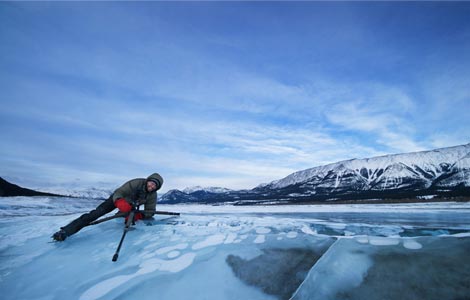Romanian films make waves from Cannes to Beijing
Updated: 2013-11-26 17:11
By Liu Wei (chinadaily.com.cn)
|
|||||||||||
Romanian movies were once a favorite among Chinese filmgoers, drawing large audiences in the mid-1970s and the early 1980s.
Now the country's "New Wave" filmmakers, who have emerged in the past decade, are dazzling a new generation of Chinese cinephiles, winning prizes at Cannes and elsewhere with the help of government funding.
Three decades ago, many Chinese people were familiar with Romanian films and their settings. While many saw the films in cinemas, it was more common then for screenings to take place at workers' clubs or outdoor screenings.
In an era when television was still a luxury for most families and the Internet was yet to be invented, these films were sweet treats for film lovers.
Scriptwriter Shi Hang, 42, saw a Romanian film for the first time when he was just 7 years old, and he was immediately impressed. He was with his parents in a packed cinema to see Alarm on the Danube Delta, a film about children saving cultural relics from smugglers.
"Cinemas in my childhood were always filled with people," he recalled. "There were very few foreign films on the big screen, most of them from socialist countries such as Albania and the Democratic People's Republic of Korea."
For Shi, the Romanian films were better than those of other socialist countries at the time, with a wider range of subject matter, good story lines and better character development.
"The popularity of old Romanian films is, of course, attributed to the particular times when Chinese people did not have much choice on the big screen, but that would be too simple and easy a conclusion to reach," he said.
"Compared to films from other socialist countries at that time, I find Romanian films more commercial, in other words, the stories are solid and characters engaging. The subjects were varied, too, including war, ordinary people and legendary heroes. The characters are complicated and their fate is often destined, which enhances their charm."
Wang Yao, 29, is a doctoral candidate at Beijing Film Academy who focuses on Eastern European films. He thinks that old Romanian films did not attain the same artistic heights as those of Poland or Czechoslovakia. Two exceptions, he said, are the works of Ion Popescu-Gopo, the master of animation, and the internationally recognized Lucian Pintilie.
However, Wang said Romanian filmmakers have improved greatly over the past decade, even winning recognition at international film festivals.
"What we call the Romanian 'New Wave' started from the early 21st century, starting with a bunch of short films traveling around the international film festivals, riding high with a group of new film auteurs and their low-budget, realistic, social-issue-driven features winning awards in main festivals," he said.
The Cannes Film Festival has been the most important platform for the Romania's New Wave filmmakers.
In 2005, Cristi Puiu's The Death of Mr Lazarescu won the Un Certain Regard prize, followed by Corneliu Porumboiu's 12:08 East of Bucharest, which won the Golden Camera the next year.
The 60th Cannes festival in 2007 honored two more Romanian films. Cristian Mungiu's 4 months, 3 weeks and 2 days, which focuses on the issue of abortion, won the Palme d'Or prize, the top prize on offer. California Dreamin' by Cristian Nemescu won the Un Certain Regard prize the same year.
Romanian films continued their run of glory in top European film festivals until Berlin 2013, when Calin Peter Netzer's family drama Child's Pose won the Golden Bear.
"These artistic films were appreciated as a New Wave because they do not simply accord with the Hollywood system or the European art house, but have unique angles to reflect the nation's history and examine its contemporary life," Wang said.
The support offered by the Romanian government has played a critical role in the success of these films.
The National Center of Cinematography has an annual budget of up to $9 million. Filmmakers can apply for 50 percent of production costs to be covered by the CNC, on the condition that they repay it within 10 years. They apply for the grant by taking part in two contests every year.
"The grant shows the Romanian government's efforts to boost its film tradition and industry, and the rewards are evident," said Wang.
Related Stories
Romania's filmmakers win kudos 2013-11-26 08:38
China, Romania seal deals 2013-11-26 01:00
Li kicks off visit to Romania 2013-11-25 21:54
Li's visit to lift China's ties with Romania, CEE countries 2013-11-25 18:18
Today's Top News
China, Romania seal railway deals
Cameron visit a chance to boost ties
Investment rules eased under reform
Aircraft carrier begins training
Liaoning begins its 1st long-distance training
Nuclear power 'to fall short of demand'
Caroline Kennedy visits tsunami-struck areas
China to loosen airspace control
Hot Topics
Lunar probe , China growth forecasts, Emission rules get tougher, China seen through 'colored lens', International board,
Editor's Picks

|

|

|

|

|

|





